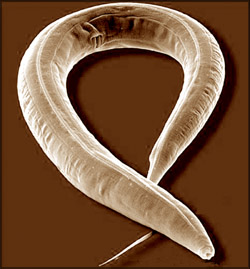Gene breakthrough could prolong life
 The
seemingly far-fetched (unlikely) day when we could live up to 30 years
more, simply by taking a pill, has moved a step closer, with the
discovery of a "longevity (long life) gene" in the humble worm. The
seemingly far-fetched (unlikely) day when we could live up to 30 years
more, simply by taking a pill, has moved a step closer, with the
discovery of a "longevity (long life) gene" in the humble worm.
Scientists have long known that a 60 per cent reduction in calorie
intake, while maintaining a healthy diet of vitamins, minerals and other
nutrients, consistently prolongs (lengthens) life by up to 40 per cent.
That also reduces the risk of cancer, diabetes and cardiovascular
(heart) disease, while cutting off age-related degeneration (worsening)
of the brain and nervous system. However, the reduction in calories
required is so drastic (severe) that many scientists joke that it only
feels like you are living longer.
But researchers at the Salk Institute for Biological Studies in La
Jolla, California, have identified a gene in
|

A nematode worm
|
nematode worms that specifically (clearly) links eating fewer
calories to living longer.
The researchers think the gene provides a vital clue as to why
persistent (continuous) hunger promotes long life.
Identifying this "longevity pathway" opens the door to the
development of drugs that would mimic (copy) the effects of calorie
restriction without having to stick to an austere (harsh) health regime.
In a paper published in Nature, Professor Andrew Dillin and
colleagues show that one of the worm's genes, pha-4, has a function
associated with living longer.
The gene works by regulating the "sweet spot" of food consumption
between the extremes of harm caused by starvation and overeating.
"After 72 years of not knowing how calorie restriction works, we
finally have genetic evidence to unravel (explain) the underlying
programme required for increased longevity," said Prof. Dillin. "This is
the first gene that is absolutely essential and specific for the
increased longevity response to dietary restriction."
Longevity was enhanced when researchers made more pha-4 genes within
the worms, suggesting that this could offer a target for life extension
drugs.
The gene can boost levels of proteins called SODs (Super Oxide
Dismutase) which mop up free radicals, harmful chemicals linked with
ageing.
Researchers think that this may be a defence mechanism that helps the
creatures tolerate starvation.
Humans possess three genes that are "highly similar" to the worm
pha-4, all belonging to the Foxa family.
All three play an important role in our early development and then
later on in life with the regulation of glucagon, a hormone made by the
pancreas that increases the concentration of blood sugar and maintains
the body's energy balance, especially during fasting.
When food is in short supply, these genes may alter glucagon levels
or cause other changes in hormones that are ultimately able to regulate
the ageing process.
The team is now going to study these human genes to see if they react
the same way as those in nematodes do when the worms are denied their
favourite treat, bacteria. Prof. Dillin said that they would also test a
range of drugs to see if they can find some that boost the activity of
the human equivalent of the worm gene and in theory, increase longevity.
So far, only one other gene, called sir-2, has been implicated
(involved) in the life and health prolonging response of the body to
calorie restriction. Increased use of the gene extends longevity of
yeast, worms and flies.
However, the link is not so clean cut (clear) because the loss of
sir-2 disrupts the calorie restriction response only in some strains of
yeast and has no effect on other organisms, such as worms.
The Daily
Telegraph |
